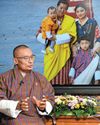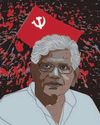While some Indian restaurants are open to experimentation, others stay true to tradition

In the busy lobby of ITC Maurya, Delhi, it is easy to bump into some well-known business honcho or a model-turned-film star (or two) and miss the direction to its most famous food outlet, Bukhara. For a place that was the first from India to enter the global list of best restaurants, the entrance, with its tiny signboard, is unobtrusive and easily missed. The decor is rustic, and not at all ‘en vogue’, with vintage 1980s-style brass work and stone walls. The focus, then, is very much on the food.
And, shocking as it may sound in the rapidly evolving Indian dine-out scene, it is a menu that has not changed for four decades. “We want to remain authentic, we want to remain simple, we want to retain the consistency of the original,” says executive chef J.P. Singh, who has headed Bukhara since the 1990s. It serves food from prePartition India’s North West Frontier Province, like tandoori naan, with its famous sikandri raan (slow-roasted marinated leg of lamb), and the iconic dal bukhara—whole black gram lentils (again slow-cooked) served with cream.
Bukhara’s success, say chefs, has been its attention to detail. Singh explains, “Each and every process is controlled strictly here—right from sourcing of the meats [through dedicated suppliers] to their weightage [the jumbo prawns are always 80g to 120g, while a lamb leg has to be 1.2kg to 1.5kg] to the entire meat marination being done in-house. Potatoes sourced are low in sugar, while the fat content in paneer is also carefully monitored.”
This story is from the {{IssueName}} edition of {{MagazineName}}.
Start your 7-day Magzter GOLD free trial to access thousands of curated premium stories, and 9,000+ magazines and newspapers.
Already a subscriber ? Sign In
This story is from the {{IssueName}} edition of {{MagazineName}}.
Start your 7-day Magzter GOLD free trial to access thousands of curated premium stories, and 9,000+ magazines and newspapers.
Already a subscriber? Sign In

Themes Of Choice
As Savvy Investors Seek New Avenues, Thematic Mutual Funds Are Gaining Popularity

A golden girl
One of India's most formidable beauties passed away earlier this month. The odd thing is she would absolutely hate this obituary; she hated being written about and avoided publicity for all of her nine decades. Indira Aswani was 93 when she died. But anyone who encountered her, even briefly, was in such awe of her grace and poise, and one could not but remember her forever.

The interest in wine is growing delightfully in India
The renowned British wine writer and television presenter Jancis Robinson, 74, recently came to Delhi and Mumbai to reacquaint herself with India's wine industry. This was the Robinson's fourth visit to India; the last one was seven years ago. On this trip, Robinson and her husband, restaurateur Nicholas Lander, were hosted by the Taj Hotels and Sonal Holland, India's only Master of Wine.

United in the states
Indian-Americans coming together under the Democratic umbrella could get Harris over the line in key battlegrounds

COVER DRIVE
Usage-driven motor insurance policies offer several benefits

GDP as the only measure of progress is illogical
Dasho Karma Ura, one of the world's leading happiness experts, has guided Bhutan's unique gross national happiness (GNH) project. He uses empirical data to show that money cannot buy happiness in all circumstances, rather it is family and health that have the strongest positive effect on happiness. Excerpts from an interview:

India is not a controlling big brother
Prime Minister Tshering Tobgay considers India a benevolent elder sibling as the \"big brotherly attitude\" is happily missing from bilateral ties. He thinks the relationship shared by the two countries has become a model of friendship not just for the region, but for the entire world. \"India's attitude is definitely not of a big brother who is controlling and does not allow the little brother to blossom and grow,\" says Tobgay in an exclusive interview with THE WEEK.

Comrade with no foes
Lal Salaam, Comrade Yechury-you were quite a guy!

Pinning down saffron
In her first political bout, Vinesh Phogat rides on the anti-BJP sentiment across Haryana

MAKE IN MANIPUR
Home-made rockets and weapons from across the border are escalating the conflict